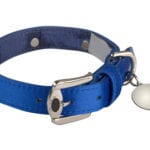
For pet parents, the best parts about coming home after a long day are the loving greetings waiting for us. Dogs are all about excited, happy barks and tails thump, thump, thumping; whereas cats will coolly saunter up and rub against our legs, which is simply their way of telling us to “pick up the can-opener already”.
Now imagine coming home to silence. Your pet has slipped free of their collar and escaped from your home or yard. How would you find them? Would they be able to find you? It’s a horrible, helpless feeling, unless you’re well prepared.
National Pet ID Week (April 20-26th) is a great reminder for pet parents to review their pet’s identification and make any necessary updates.
• All pets (indoor or outdoor) should have a collar and tags with their name, along with your current address and phone number. Vaccination and license tags can also help identify lost or stolen animals.
• Did you move recently? Check to be sure all tags and information have been updated to include your new address and contact information.
However, the best method for animal identification is the permanent microchip. Microchipping is a quick and painless procedure for animals that can make the difference between a happy ending and heartbreak should they get lost or injured.
Most veterinary practices and shelters routinely scan for chips in stray or injured animals. If you haven’t talked to your veterinarian about microchipping, here are two really great reasons to do it today:
According to a recent study, cats with microchips were 20 times more likely to be returned to their homes than lost cats without microchips. For dogs with microchips, the return rate is 2.5 times higher than those without. With National Kids & Pets Day and World Veterinary Day coming up April 26th, updating your pet’s identification makes a great way to close out the week!

